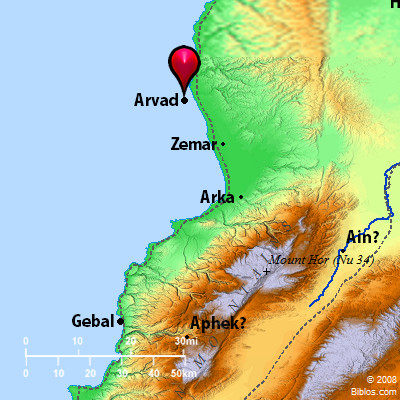Atlas  Arvad and surrounding area Maps Created using Biblemapper 3.0 Additional data from OpenBible.info You are free to use up to 50 Biblos coprighted maps (small or large) for your website or presentation. Please credit Biblos.com. Occurrences Ezekiel 27:8 The inhabitants of Sidon and Arvad were your rowers: your wise men, Tyre, were in you, they were your pilots.Ezekiel 27:11 The men of Arvad with your army were on your walls all around, and valorous men were in your towers; they hanged their shields on your walls all around; they have perfected your beauty. Encyclopedia ARVAD; ARVADITESar'-vad, ar'-vad-its ('arwadh; Arados; modern Ruad): An island city off the coast of Syria some 30 miles North of Tripolis, and the race inhabiting it. It was a barren rock covered with fortifications and houses several stories in height. The island was about 800 ft. long by 500 wide, surrounded by a massive wall, and an artificial harbor was constructed on the East toward the main land. It developed into a trading city in early times, as did most of the Phoenician cities on this coast. It had a powerful navy, and its ships are mentioned in the monuments of Egypt and Assyria. It seems to have had a sort of hegemony over the northern Phoenician cities, from Mt. Cassius to the northern limits of Lebanon, something like that of Sidon in the South. It had its own local dynasty and coinage, and some of the names of its kings have been recovered. Its inhabitants are mentioned in the early lists of Genesis 10:18, and Ezekiel 27:8, 11 refers to its seamen and soldiers in the service of Tyre. It brought under its authority some of the neighboring cities on the main land, such as Marathus and Simyra, the former nearly opposite the island and the latter some miles to the South. AR'VAD, a small island 2 ms. off the coast of Syria and now called Ruad with about 2000 inhabitants and some ruins of an ancient town. The people are sailors and sponge fishers. The rocky ridge is about 880 yards by 550 in area. Mentioned only in Ezek. 27:8, 11. Strong's Hebrew H719: Arvada city of Phoenicia |



